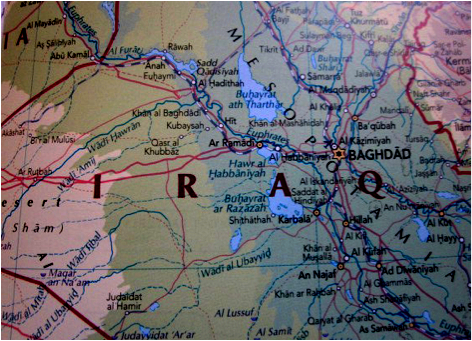When children are made seriously ill, disabled or killed in military conflict - can you help?
 By Peter Limbrick
By Peter Limbrick
At the end of last year Martin Chulov wrote in the Guardian newspaper (30/12/10, see link below) about research that links a rise in birth defects and cancers to US military action in Falluja in Iraq 6 years ago. He says, 'The findings are likely to prompt further speculation that the defects were cause by depleted uranium rounds, which were heavily used in two large battles in the city in April and November 2004.'
The research, he says 'confirms earlier estimates...of a major, unexplained rise in cancers and chronic neural-tube, cardiac and skeletal defects in newborns.' The city's obstetricians, we are told, have complained that they are still overwhelmed by the sheer number of serious defects.
Children have never fared well in war zones. Thousands (tens of thousands?) of small bodies in Iraq have already been filed away as 'collateral damage' when weapons went astray or someone pin-pointed the wrong target. Now, after the battle is long over, the environment itself becomes the agent of disability and death for generations to come.
Neither the US government nor ours gets very heated about this as far as I am aware. Bodies are not counted, brain injury and amputations have not been catalogued, there is no inventory of parents becoming childless or children becoming orphans. Acknowledgement and apology come rarely and only after exposure and arm twisting.
Last December's Guardian story could be dismissed as old news – except that the next war is not very far into the future, it never is. Will it be Pakistan, Iran, sub-Saharan Africa? When it is underway, going on past experiences, politicians will become all puffed-up because it is a really big thing on their watch, arms companies will relish opportunities to test out new weaponry overtly or covertly, and innocent civilians will become untidy heaps of collateral damage – which, the politicians will assure us, is sad but inevitable.
This infliction of death and disability on children and adults in other countries is only inevitable if we allow our politicians to get away with it. It seems to me that those of us in the UK who campaign for better lives for disabled children, teenagers and adults should acknowledge what is done in our name when we send our military off on their adventures. If we can acknowledge it, and say so publicly, then our MPs, in time, might also acknowledge it. Then, perhaps, the government could be shamed into treating the prevention of collateral damage as a major factor in their management of the armed forces during any conflict.
Do you know more about this than I do? Are you campaigning on this issue in the UK, Iraq or another country? Please get in touch. I will keep a space in the Bulletin to report whatever projects come to me.
Here are some relevant websites and links:
The Guardian story:
http://www.guardian.co.uk/world/2010/dec/30/faulluja-birth-defects-iraq
Children of Iraq Association:
http://www.coia.org.uk/
'Violations of Iraqi Children's Rights' by Dr. Souad N. Al-Azzawi
http://www.globalresearch.ca/index.php?context=va&aid=18205
'On The Ground In Iraq: Serving The Needs Of Disabled Iraqi Children' by Julia Steers
http://www.huffingtonpost.com/2011/02/07/on-the-ground-in-iraq-ser_n_819948.html

